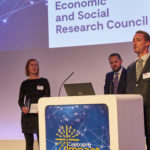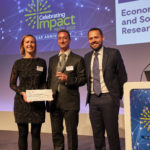Fact & Fiction: The Future of Democracy | Nobel Prize Dialogue Brussels 2024
In March 2024, Michael Bruter joined several eminent Nobel Prize laureates and world-leading scientists at the Nobel Prize Dialogue on the Future of Democracy at Brussels Palais des Beaux-Arts (Bozar). The event was organised by the Nobel Prize in partnership with the European Research Council and the Belgian Presidency of the European Union.
Speakers included Nobel Prize laureates Ben Feringa, Paul Nurse and Maria Ressa, Oleksandra Matviichuk, Head of Center for Civil Liberties, recipient of the 2022 Nobel Peace Prize as well as other experts such as Demis Hassabis, CEO DeepMind, and European Research Council grantees Michael Bruter and Emilie Caspar.
Making democracy work for everyone | European Parliament STOA Annual Lecture 2024
On 24 January, 2024 EPO Director Michael Bruter was invited to give the European Parliament’s Annual Keynote speech on the Future of Science and Technology (STOA lecture), on “Making democracy work for everyone”. Around the event, Michael also gave a number of interviews to media and research organisations. As an example, you can read his interview by the European Science Media Hub here.
2023: ESRC Celebrating Impact Award Winners!
In November 2023, Sarah Harrison and Michael Bruter jointly won the ESRC Celebrating
Impact “Outstanding International Impact” for their research in electoral psychology and electoral ergonomics.
You can learn more about the research behind the award below:
Images from the event:
2019: Jean Monnet Europa Policy Lab: Making Elections Work for Citizens: Optimising Electoral Ergonomics and the Electoral Experience of Vulnerable Voters
13th May, 2019 at the Australian National University, Australia
Professor Michael Bruter and Dr Sarah Harrison were invited to the Europa Policy Lab to discuss the interface between elements of electoral organisation and management and the psychology of voters.Their presentation covered how to improve voters’ electoral experience and satisfaction and ensure effective access, equality of experience and inclusion both for voters in general and specific categories such as first time voters, disabled voters, etc. The discussion identified some of the key problems and inefficiencies that Electoral Management Bodies may face both in the run up to an election and on Election Day itself and deal with practical solutions to them one by one.



